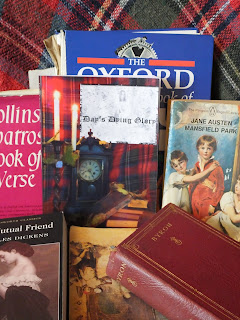Today, in Caithness, the sun is shining and the air is clear. I'm sure it will come as no surprise to anyone reading this blog that, certain weathers and certain times of the year ignite certain music in me. And, on late winter days which are filled with sunshine, I am usually to be found singing the songs of The Spinners . Inevitably, I start humming different ones of their songs (and of course adapting them to be about Orlando and Jess) as I go around doing different things. But I remember almost all the words to them. I haven't heard a lot of them in years, but they are all there, rooted in my memory. It is truly fascinating to think about how these songs have passed through history. They are part of my own nostalgia, which is why crisp sunny mornings make me incapable of ignoring the temptation to sing them, but they are part of something much bigger. There are songs amongst them which are a newer step in the folk music movement. Songs like Silver in the Stubble are amongs...
As an Historical Fiction author, research is paramount. I could write and write and write on this topic! It might come as a bit of a surprise, then,
that I’m about to throw out the crazy suggestion that research is best performed
around the edges of writing a story.
Whatever your story is, make your book about the story first, and then the
research.
 |
| A few books for research and inspiration |
I absolutely love researching things. I love delving into the realms of history
and, if I’m honest, I tend to lose myself there. Despite that, my books stay 100% focused on
the adventures and choices of my characters.
Most things (unless you’re writing in a speculative field) can be
researched to fit in with your story. It
doesn’t matter if you're looking at historic events, geographical phenomena, or
the impact and effects of drugs, you can usually find a way to make the
research fit the story.
Most writers have already done some form of research before
they put pen to paper. After all, you
chose your genre for a reason, so you must have had some previous knowledge or idea
of that topic. My course of action is
usually:
·
get an idea
·
check the general gist and attitude of the time
and place
·
write the story
·
research finer details as I write
This way, I can match my research with my characters, having
them brush shoulders with Wellington, or storm Seringapatam, or both! I am spectacularly proud of the fact readers
commend me on the way in which my books are wholly believable whilst being
intrinsically fictitious.
Here are a few thoughts on research for books:
- It’s your character’s story, not yours. Research as though you’re your character. See things through their eyes and not with our 20:20 hindsight and understanding.
- It’s all about the story. You should be able to tell your family/friend/neighbour the outline of your plot without ever having to reference how much research you’ve done. The research should just enhance your story, not dominate it.
- You’re not writing a textbook (unless you are, in which case: ignore this point!). Don’t throw in so much detail that your readers feel they’re about to be made to sit an exam on the subject. Slotting in samples of research, dotting them throughout a book, allows your reader to be immersed in your research and knowledge without feeling intimidated by it.
- There is no such thing as too much research, only poor inclusion of said research. The more you know, the better the flow! Extensive research allows your world and characters to feel tangible and sympathetic, both things which are central to effective writing.
Comments
Post a Comment